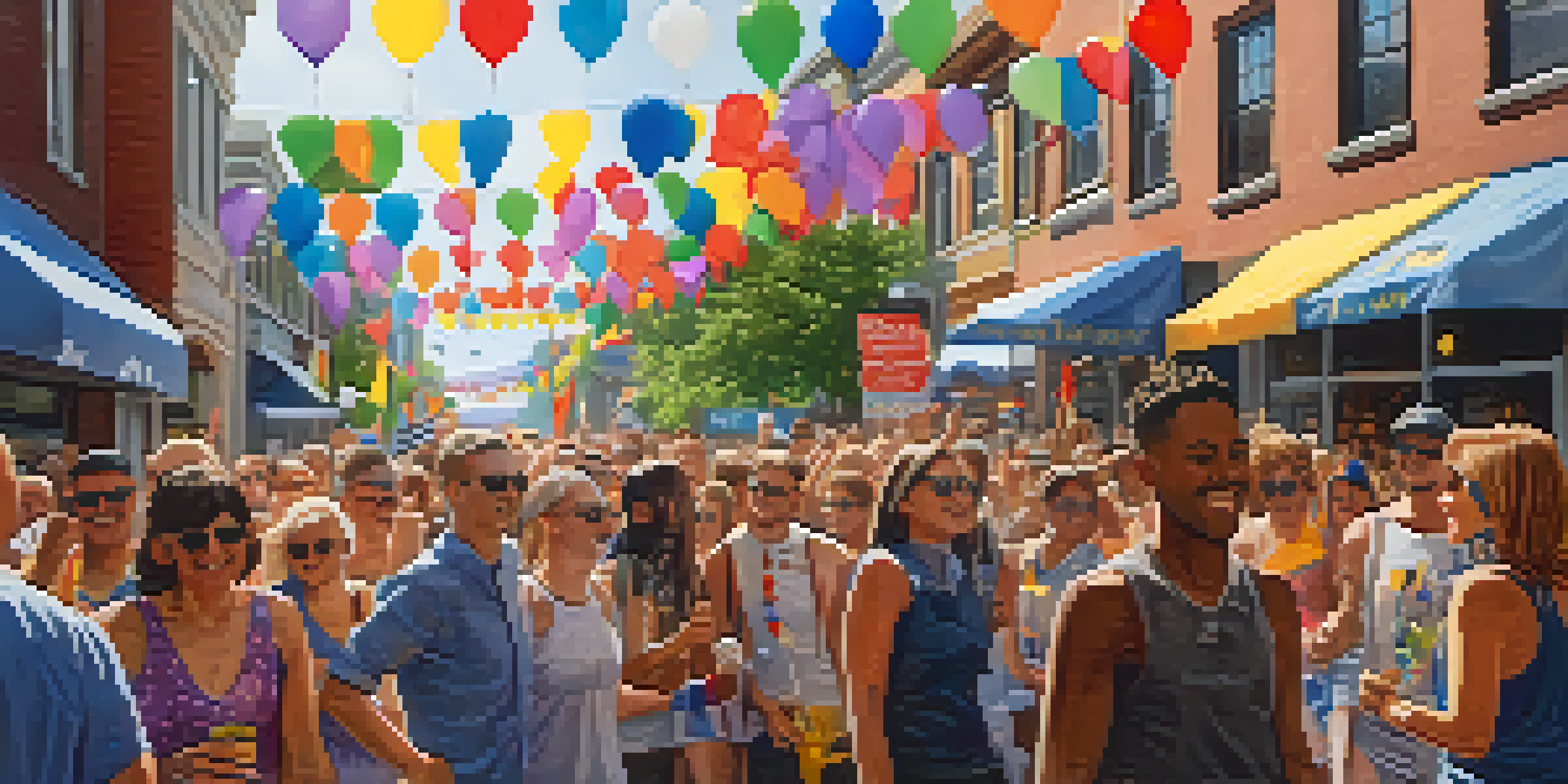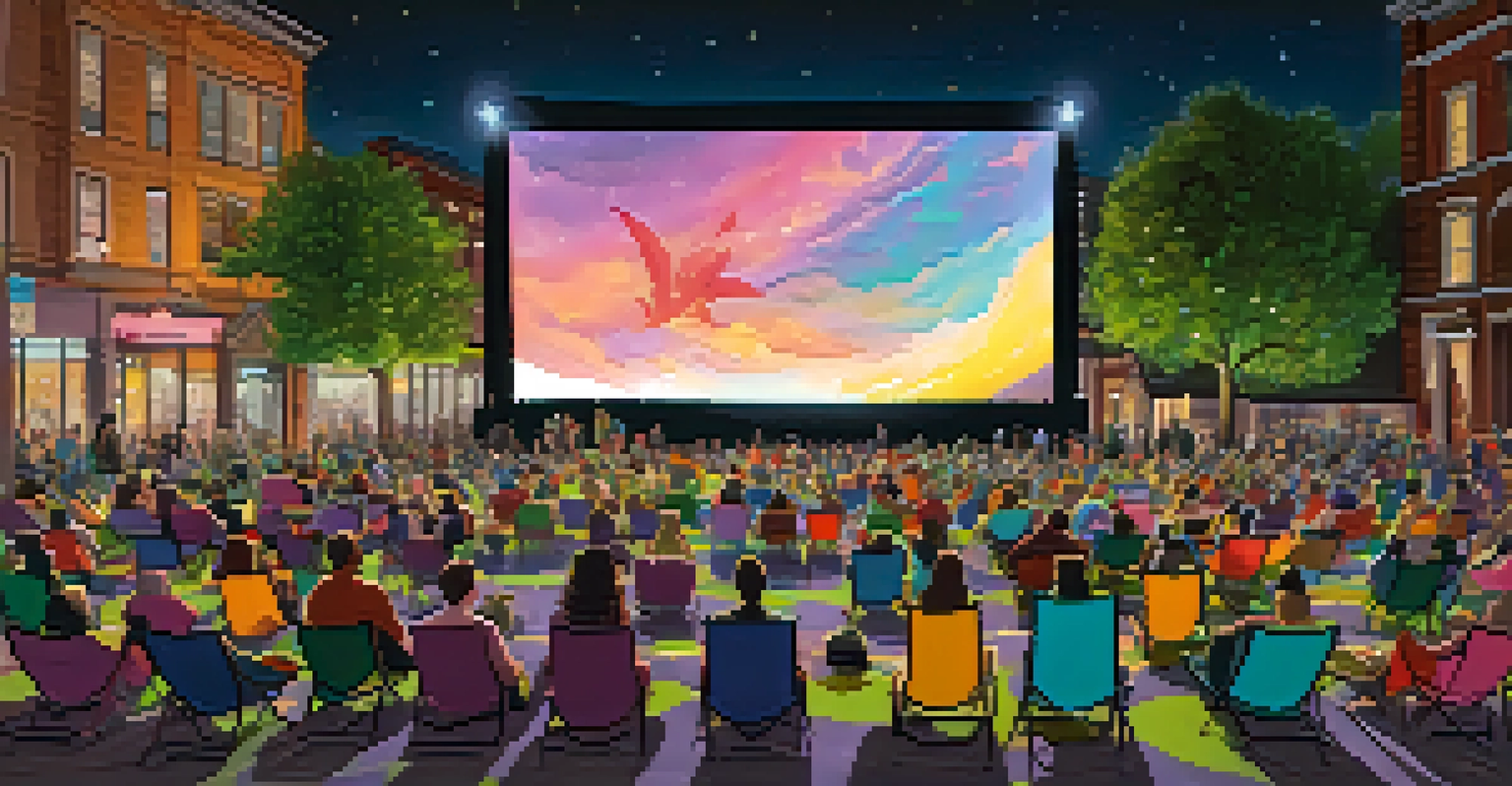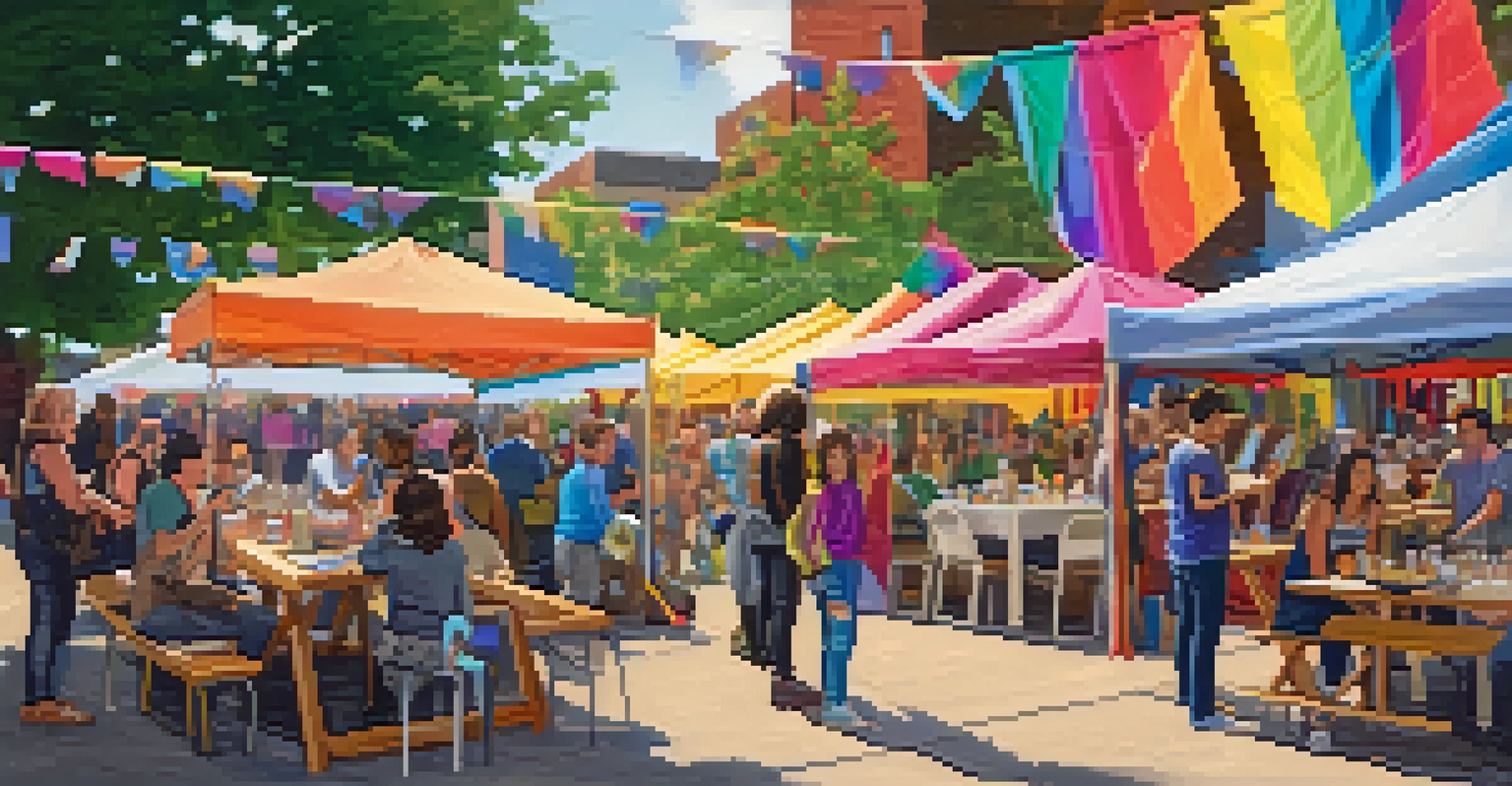The Role of LGBTQ+ Festivals in Portland's Cultural Identity

A Brief History of LGBTQ+ Festivals in Portland
LGBTQ+ festivals in Portland have a rich history, dating back to the early 1970s when the first Pride celebrations emerged. These events were born out of a need for visibility and acceptance in a society that often marginalized LGBTQ+ individuals. Over the years, they have grown in scale and significance, fostering a sense of community and belonging for many.
The beauty of standing up for your rights is that you pave the way for others.
Today, festivals like the Portland Pride Parade and the Portland Queer Film Festival attract thousands of attendees each year, showcasing the city's commitment to diversity. These events not only celebrate LGBTQ+ culture but also serve as a platform for important social issues, including equality and representation. The evolution of these festivals reflects broader societal changes and the ongoing fight for LGBTQ+ rights.
As these events continue to flourish, they play a crucial role in shaping Portland's identity as a welcoming and inclusive city. By honoring their history, attendees and organizers alike contribute to a legacy of resilience, joy, and advocacy that resonates throughout the community.
Building Community Through Celebration
LGBTQ+ festivals serve as vital spaces for community building, bringing together individuals from diverse backgrounds. These events foster a sense of belonging, allowing attendees to express their identities freely in a supportive environment. The shared experience of celebration creates bonds that can last well beyond the festival's duration.

Whether it's through live performances, art exhibits, or simply mingling with others, the atmosphere at these festivals is electric and welcoming. Attendees often describe the feeling of being 'seen' and 'accepted,' which can be transformative for individuals who may feel isolated in their everyday lives. This sense of community is particularly important for marginalized groups within the LGBTQ+ spectrum.
LGBTQ+ Festivals Foster Community
These events create vital spaces for individuals to connect, express their identities, and build lasting bonds.
Moreover, these festivals often collaborate with local organizations and businesses, further strengthening community ties. By supporting local artists and vendors, festivals contribute to the economy while promoting inclusivity and diversity in the broader Portland area.
Promoting Social Justice and Advocacy
Beyond celebration, LGBTQ+ festivals in Portland play a pivotal role in advocating for social justice. Many events include educational components, such as workshops and panel discussions, that address pressing issues like discrimination, mental health, and legal rights. These platforms empower attendees with knowledge and resources to effect change in their own lives and communities.
Diversity is the one true thing we all have in common. Celebrate it every day.
Activism is often woven into the fabric of these festivals, with organizations using the platform to raise awareness about current issues facing the LGBTQ+ community. From fundraising efforts to awareness campaigns, festivals amplify voices that are often marginalized in mainstream discourse. This focus on advocacy ensures that the celebration of identity is accompanied by a commitment to progress.
By fostering dialogue and encouraging activism, LGBTQ+ festivals create a space where community members can come together to envision a more equitable future. Each year, these events remind participants that the fight for equality continues, and that their collective efforts can lead to meaningful change.
Showcasing Diverse Talents and Arts
Portland's LGBTQ+ festivals are a vibrant showcase of diverse talents and artistic expressions. From drag performances to visual art displays, these events celebrate the creativity within the LGBTQ+ community. Artists often find a platform to share their work, gaining recognition and support from festival-goers.
The inclusion of various art forms not only entertains but also educates attendees about the rich tapestry of LGBTQ+ culture. For many artists, participating in these festivals is an opportunity to share personal stories and experiences, fostering deeper connections with the audience. This exchange of creativity enhances the overall festival atmosphere, making it a truly unique experience.
Advocacy and Social Justice Focus
Beyond celebration, LGBTQ+ festivals serve as platforms for educating attendees on important social issues and promoting activism.
Moreover, these festivals often highlight underrepresented voices within the LGBTQ+ community, shining a light on the importance of intersectionality. By promoting artists from various backgrounds and identities, Portland's festivals contribute to a more comprehensive understanding of the diversity within the LGBTQ+ spectrum.
Fostering Economic Growth and Tourism
LGBTQ+ festivals have a significant impact on Portland's economy, drawing visitors from far and wide. These events not only boost local businesses but also create job opportunities in various sectors, from hospitality to event management. By attracting tourists, festivals contribute to the city's financial stability and growth.
As attendees flock to the city for these celebrations, they often explore Portland's rich culture, food, and attractions. This influx of visitors helps promote Portland as a welcoming destination, enhancing its reputation as an LGBTQ+ friendly city. Local businesses benefit from increased foot traffic, which can lead to lasting relationships with new customers.
The economic benefits extend beyond the festivals themselves, as many visitors return to Portland throughout the year. This ongoing interest further solidifies the connection between the LGBTQ+ community and the city's cultural identity, making Portland a vibrant hub for diversity and inclusion.
Encouraging Intergenerational Connections
LGBTQ+ festivals in Portland create unique opportunities for intergenerational connections, bridging the gap between different age groups within the community. These events attract a wide range of attendees, from young activists to seasoned advocates, fostering an atmosphere of shared knowledge and experience. Such interactions can be invaluable, as older generations share their stories of resilience and progress.
For younger attendees, connecting with those who have paved the way can be both inspiring and educational. These personal connections help to instill a sense of responsibility for the ongoing fight for equality, motivating younger generations to continue advocating for their rights. The exchange of ideas and experiences nurtures a culture of support and understanding.
Economic Impact on Portland
LGBTQ+ festivals significantly contribute to the local economy by attracting visitors and boosting business in various sectors.
Additionally, festivals often feature programming tailored to various age groups, ensuring that everyone feels included. By creating spaces for dialogue and connection, LGBTQ+ festivals strengthen the community's fabric, ensuring that the struggles and triumphs of the past are honored and remembered.
Promoting Mental Health and Well-Being
The mental health benefits of participating in LGBTQ+ festivals cannot be overstated. For many, these events provide a much-needed break from the challenges and stigmas they may face in their daily lives. The sense of camaraderie and acceptance can significantly boost self-esteem, fostering a positive self-image among attendees.
In addition to celebrating identity, many festivals incorporate mental health resources, offering support and information for those seeking help. By prioritizing mental well-being, these events address a critical aspect of the LGBTQ+ experience, acknowledging the unique challenges many face. This holistic approach demonstrates that the festivals are not just about celebration, but also about care and support.

Ultimately, LGBTQ+ festivals create safe spaces where individuals can connect, heal, and thrive. The positive atmosphere encourages attendees to embrace their identities while also reminding them that they are not alone in their journey.